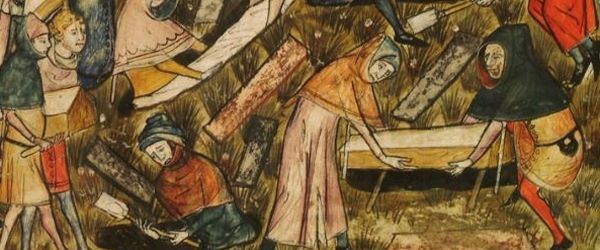
A demonstration of compassion: Epidemics and the Church’s response to disease
By Andy Rist in Ukraine — The church has never been immune to the great plagues of history, but she often served as God’s instrument of healing to the dying world. As early as the second century, the church fearlessly confronted the Antonine Plague (many speculate that this was smallpox) that killed millions in the Roman Empire, by offering hope and compassion to the sick and destitute. A century later, the Plague of Cyprian (perhaps something related to Ebola) struck the empire, and even the pagan Emperor Julian observed how Christians cared for the sick, regardless of the danger, as millions perished.
During those two epidemics, the fear of death undermined the confidence of Roman society in their pantheon of gods. Physicians knew the risk and often left when they were most needed because they could not fight against the spread of disease. But the Christians, who preached a message of hope and life beyond the grave, remained to serve the multitudes who were suffering. The church of Jesus Christ grew as Christian principles were proven to be true in the crucible of crises. Christians came to the rescue and demonstrated the compassion of Jesus to their friends and neighbors who were in deep distress.
Over a thousand years later, the bubonic plague of the 14 th century attacked the continent of Europe, and during this epidemic the church failed. Estimates vary, but historians place the death toll at 30-50 percent of the entire European population, maybe higher. During this plague, many Roman Catholic priests abandoned the sick, out of fear for their own lives. Historians believed this plague weakened the Catholic Church, which served as an essential factor towards the advent of the Reformation that began 150 years later.
The bubonic plague, sometimes called the Black Death, resurfaced in various regions of Europe in the following years. In August 1527, the plague struck the city of Wittenberg. The faculty of the university hastily prepared to leave the city, except for Martin Luther. He was convinced that it was his Christian duty to stay and minister to the sick. Luther’s decision to remain in Wittenberg came at a cost, because his infant daughter, Elizabeth, died as a result of the plague.
Luther wrote a 14-page pamphlet explaining his theological convictions, entitled “Whether One May Flee from a Deadly Plague,”
which was reprinted 19 times and read widely across the continent. Luther’s writing is encouraging, as well as instructional, and many of his conclusions apply today as we ponder over the sudden impact of COVID-19 on our lives.
In his moment of crisis, Luther appealed to the words of Jesus in Matthew 25:41-46, “I was sick and you did not visit me.” Luther writes, “According to the passage we are bound to each other in such a way that no one may forsake the other in his distress but is obliged to assist and help him as he himself would like to be helped.” Luther recognized that if his neighbor was hungry or thirsty, he must offer him food and drink even if that meant personal sacrifice and loss.
Then Luther addressed the issue: “If a deadly epidemic strikes, we should stay where we are, make our preparations, and take courage in the fact that we are mutually bound together so that we cannot desert one another or flee from one another.” God’s purpose for this calamity was severalfold, including to test our faith and love.
God tests our faith to determine how we will act toward him, and our love as to how we will demonstrate kindness and concern to our neighbors in their greatest moment of need.
One more thought: Luther did charge each of us to take physical precautions, such as taking medicines and fumigating our homes, to prevent further contagion of disease. At times Luther thought it was necessary to “avoid places and persons where my presence is not needed in order not to become contaminated and thus perchance infect and pollute others.” He found a balance—he would not foolishly cause further harm to his neighbor, but he would not avoid his neighbor if called upon for help.
In the same manner as believers faced the onslaught of disease in earlier centuries, we live in this God-ordained moment with opportunities to display the love of Christ to others. Luther states, “Under the stormy and dark sky of fear and anxiety, (let us not) forget and lose Christ, our light and life, and desert our neighbor in his troubles.”
Additional Posts





